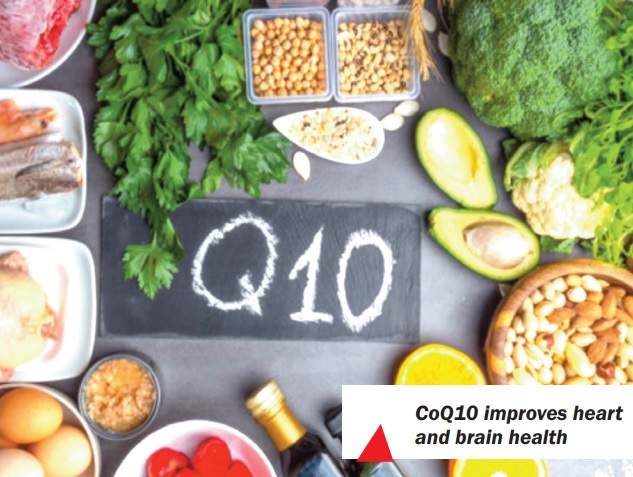
COQ10: Treats heart failure?
Heart failure (HF) is a public health issue of global importance. In Ghana, a study by Amoah and Kallen (2000) revealed that the main causes of heart failure were hypertension (21.3 per cent), rheumatic heart disease (20.1 per cent), and cardiomyopathy (16.8 per cent).
Additionally, congenital heart disease and coronary artery disease accounted for 9.8 and 10 per cent of cases, respectively.
Advertisement
Despite the existence of pharmaceutical or conventional approaches to managing cardiovascular related diseases, there are natural approaches which have equally proven to be effective.
One such natural remedy is the ingredient,CoQ10.
Below are scientific reviews on this ingredient in cardiovascular management.
CoQ10 is a vital nutrient which works like an antioxidant in the body.
In its active form, it is called Ubiquinone or Ubiquinol.
CoQ10 is found in the human body, particularly, in the heart, liver, kidneys and pancreas.
It is stored in the mitochondria of your cells, often called the cells’ “powerhouse,” which is why it is involved in energy production.
In a study by Oregon State University, natural synthesis of CoQ10,plus dietary intake, seemed to provide sufficient amounts to help prevent a CoQ10 deficiency in healthy people
Benefits: Heart
In a study by Mortensen et al.,(2014) involving 420 people with heart failure, treatment with CoQ10 for two years improved their symptoms and reduced their risk of dying from heart problems.
Another retrospective study was conducted by Morisco et al.,(1993) which involved 641 people using CoQ10 or a placebo for a year.
The researchers found that the CoQ10 group had been hospitalized less frequently for worsening heart failure and had fewer serious complications.
For those on pharmaceutical drugs such as statins, CoQ10 supplementation may be useful, as it deals with the side effects.
Blood pressure?
One review by Barbara (2002) reports that CoQ10 has potential for use in prevention and treatment of cardiovascular disease, particularly hypertension (high blood
pressure), hyperlipidemia, coronary artery disease, and heart failure.
Further clinical trials are warranted, but because of its low toxicity it may be appropriate to recommend coenzyme Q10 to select patients as an adjunct to conventional
treatment.
PH level
A study by Conklin,(2005) found that supplementing with CoQ10 during cancer treatment may help to increase the cancer-killing potential of these medications (like doxorubicin and daunorubicin).
There is also evidence that CoQ10 can protect the heart from DNA damage that can sometimes occur from high doses of chemotherapy medications.
Another study by Hertz and Lister (2009) also found that CoQ10 may improve survival rates in end-stage cancers.
The interesting thing is that, these studies are far from hard proof, but they are encouraging beginnings to the thought that CoQ10 supplementation may help
improve survival with certain cancers.
Rusciani et al.,(2007) in their study indicated that supplementing with CoQ10 may help reduce the chance of cancer recurrence.
Fertility, diabetes
Six clinical studies ( Lewin and Lavon,1997; Safarinejad, 2009; Nadjarzadeh,2011; Safarinejad, 2010; Lafuente et al.,2013; Ahmadi et al.,2016) found that CoQ10 can help improve fertility issues in men.
One study by Amin et al., (2014) showed that CoQ10 improves insulin sensitivity and regulates blood sugar levels.
Two studies (Eriksson et al.,1999; El-ghoroury et al., 2009) also showed that CoQ10 increases concentrations in the blood by three times in people with diabetes who typically show low levels of this compound.
A retrospective study by Zahedi et al.,(2014) further found that those with type 2 diabetes who take CoQ10 for 12 weeks significantly reduced their fasting blood sugar levels and hemoglobin A1C.
Finally, Abdali et al.,(2015) reports that CoQ10 averts diabetes by stimulating the breakdown of fats and reducing the accumulation of fat cells that could lead to obesity or type 2 diabetes.
Food sources
A study by Weber et al., (1997) found that CoQ10 is absorbed in capsule form or through foods. Hence, the following foods contain CoQ10:
• Organ meats: Heart, liver and kidney
• Some muscle meats: Pork, beef and chicken
• Fatty fish: Trout,herring, mackerel and sardine
• Vegetables: Spinach, cauliflower and broccoli
• Fruits: Oranges and strawberries
• Legumes: Soybeans, lentils and peanuts
• Nuts and seeds: Sesame seeds and pistachios
• Oils: Soybean and canola oil
CoQ10 supplement dosage
An article by Griffin (2021) recommends 50–1,200 milligrams per day.
Most supplements fall within the 100–200 milligram range.
Alternatively,90 milligrams up to 1,200 milligrams is also acceptable. This larger dose has typically been used only to study the neurological benefits of CoQ10.
Most successful studies have used between 100 – 300 milligrams (Levy,2019).
From studies,CoQ10 improves heart and brain health, lowers sugar level, slows aging and fights cancer.
The writer is a Professor of Naturopathic Healthcare/President of Nyarkotey College of Holistic Medicine &Technology (NUCHMT)/African Naturopathic Foundation.
E-mail: [email protected]




